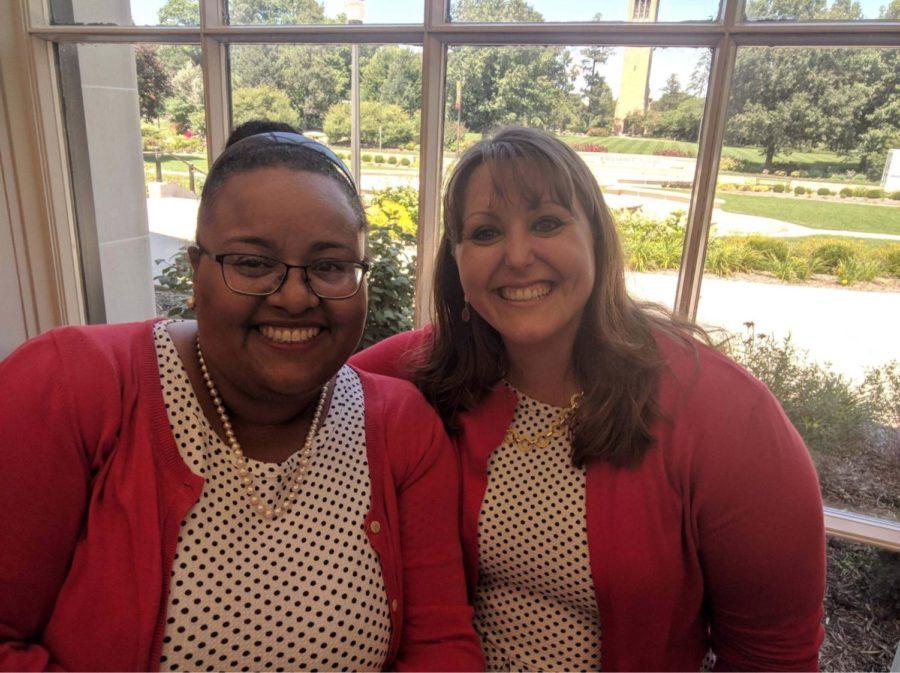Cardinal Women: ‘Women of excellence’
Tera Lawson and Denise Williams-Klotz, the co-founders and program facilitators, created Cardinal Women* in 2017.
September 5, 2018
Once a Cardinal Woman, always a Cardinal Woman.
Seventy-two women who are faculty, professional and scientific staff at Iowa State have been chosen to engage in discussions designed to advance their personal and professional lives.
Cardinal Women is open to faculty and staff who identify as women. This includes women who are cisgender, trans, of trans experience and more.
The program was created by Tera Lawson, program coordinator for the Center for Technology in Learning and Teaching, and Denise Williams-Klotz, assistant director of Multicultural Student Affairs.
Lawson and Williams-Klotz received 138 applications to become Cardinal Women and eventually narrowed it down to 72. The 72 women will participate in four discussion times, each focusing on a specific topic.
The first two discussions were held on Aug. 8 and Sept. 5 and the last two will be held on Nov. 7 and Dec. 5. Each discussion is two hours long and will be held in the Memorial Union. The topics of discussion include identifying and silencing the inner critic, discovering and utilizing your inner mentor, communication style strategies, approaches to negotiation and how to support and affirm those who identify as women in our community. The topics will be discussed in the order listed.
When choosing the 72 women, Lawson and Williams-Klotz sought to keep the group as diverse as possible. The Cardinal Women are from all different backgrounds, experience levels and different areas of work at Iowa State.
During the discussions, the women are split into groups of eight with one discussion leader. During the first discussion, the groups created their own names: purposeful, strong, powerful, wise, vocal, strategic, distinctive and changemaking.
The discussions are closed off to the public in order to create a safe and welcoming space where the women feel comfortable sharing their experiences. Establishing a safe place was, and is, very important to the program creators because “this stuff is tough and it requires a lot of personal development,” Lawson said.
The program is a result of another idea from Sarah Nusser. Nusser, vice president for research, wanted a group of women at Iowa State to participate in Tera Mohrs “Playing Big” program. “Playing Big” is a book about practical wisdom for women who want to speak up, create and lead.
Mohrs’ book gives women the practical skills to voice and implement changes they want to see. Nusser recruited Dawn Bratsch-Prince, associate provost for faculty, and Tera Lawson to submit a proposal to facilitate and participate in the program.
Bratsch-Prince and Lawson submitted an application to the 2017 Women’s in Diversity Grant Program and it was chosen for funding. The proposal was called, “Playing big: developing leadership skills for women staff and faculty.” From that proposal, the Cardinal Women program was born.
Ten women and three co-facilitators participated in the original grant program. After its end, Lawson and Williams-Klotz volunteered themselves to determine what was next.
“We looked at all the things that were most beneficial from our experiences as participants in that program, and then Denise and I volunteered one another that we would come up with a program that would invest in the personal and professional development of other women at Iowa state and allow us to expand our community of women of excellence,” Lawson said.
Cardinal Women got its name from the definition of the word cardinal, which is “of the greatest importance; fundamental.” Lawson and Williams-Klotz explained that women often put off self-care in order to do other things.
Their slogan is, “the time for us is now.” Their choice of words wants women to understand the importance of not limiting yourself, and to focus on improving yourself now.
Lawson and Williams-Klotz are excited for the remainder of this program because they’ve already established relationships within the first session. They hope the 72 Cardinal Women find the discussions to be empowering and enjoyable. Williams-Klotz is excited to build something that could “come back and benefit the university in a lot of ways.”
While this is the first year of Cardinal Women, and the future is unclear, once you’re a Cardinal Women, you’re always a Cardinal Women. New women of excellence may come through, but Lawson said, “you will always be there in spirit.”







